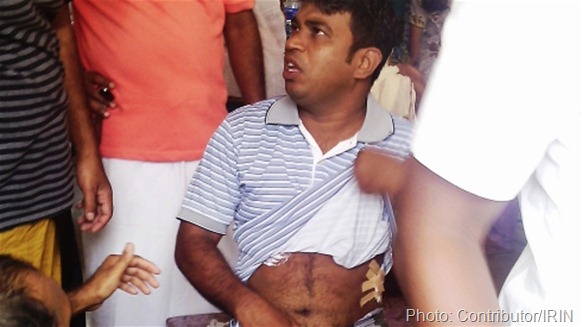(IRIN) – Sri Lanka’s government should take action to prosecute acts of communal violence and promote peace, say observers, following the worst clashes in five years that left at least two dead and over 80 injured.
On 15 June clashes between Muslim community members and hardline Buddhist groups broke out in Dharga Town, a Muslim-majority town in the southern Kalutara District, about 60km from the capital Colombo.
“There is a real risk of violence spreading elsewhere unless the government acts immediately,” David Griffiths, Asia-Pacific deputy director at Amnesty International, told IRIN.
 “This is an issue that has been brewing for some time and that should have been addressed long ago,” he said, pointing to a history of tension in the lead-up to the 15 June violence, which saw two days of riots by the hardline Buddhist group Bodu Bala Sena (“Buddhist Force” – BBS) following a rally in the town of Aluthgama, 5km from Dharga Town.
“This is an issue that has been brewing for some time and that should have been addressed long ago,” he said, pointing to a history of tension in the lead-up to the 15 June violence, which saw two days of riots by the hardline Buddhist group Bodu Bala Sena (“Buddhist Force” – BBS) following a rally in the town of Aluthgama, 5km from Dharga Town.
Ajith Rohana, a police spokesperson, said 50 people had been arrested on suspicion of taking part in the riots. “We are conducting investigations into what took place and who was responsible,” he said.
UN High Commissioner for Human Rights Navi Pillay condemned the violence on 16 June, adding: “I am very concerned this violence could spread to Muslim communities in other parts of the country… The authorities must immediately bring the perpetrators of such attacks to book and make it clear… that there is no place for inflammatory rhetoric and incitement to violence.”
According to Mohideen Iqbal, a resident of Dharga Town who witnessed the initial clashes before fleeing, “most of the town’s Muslims were at the mosque when the [BBS] convoy passed through, and there was a lot of tension in the area.”
Sri Lanka’s President Rajapaksa on 18 June met religious and community leaders in the area, and promised an impartial inquiry into the incident and government assistance to rebuild damaged property. Police have subsequently banned all forms of religious rallies.
However, analysts say, in order to prevent further violence, the government’s response will need to go beyond repairing property and relations after this specific event.
“The government must show minorities, including the Muslims, that they are part of this country, that they have the same rights like anyone else,” argued Jehan Perera, who heads the national advocacy body the National Peace Council (NPC).
Over 250,000 displaced Muslims
Sri Lanka is home to about two million Muslims, a large number of whom live in the east and northwest of the country – areas which were beset by violence during the 26-year-long civil war that ended in May 2009.
Some 75,000 Muslims were forced to flee northern Jaffna District in 1990 after being threatened by the Liberation Tigers of Tamil Eelam. With the displaced Muslim population now numbering over 250,000 and no resettlement plan, leaders have criticized the government for its lack of attention.
“There have been instances of deliberate targeting of Muslim-owned business premises in the past,” said Hilmy Ahmed, spokesperson for Muslim Council of Sri Lanka, pointing to incidents such as the 13 May 2013 attack on a Muslim-owned clothing store just outside Colombo, and the alleged arson at a Muslim-owned clothing store on 21 June 2014. Both incidents are under investigation.
After the 11 April BBS disruption of a Muslim press conference in Colombo, leaders were concerned about the potential for violence around the BBS rally.
Muslim leaders, including Faiszer Musthapha, deputy minister of investment promotion, wrote to the Ministry of Law and Order before the rally warning that tension was high in the Aluthgama area and seeking more security.
In a second letter sent by a collective of Muslim groups to the inspector-general of police on 14 June, leaders said: “We call upon you to take immediate and decisive action to safeguard the lives and property of Muslims in Aluthgama and surrounding areas.”
Government inaction criticized
NPC’s Perera argued that for violence to break out even after such clear warnings demonstrated the government was not taking the issue seriously.
“It shows a breakdown in law and order. Now it is time to show the victims and the rest of the country that the government is willing to take hard, uncomfortable decisions,” he said.
Amnesty’s Griffiths said preventing the spread of violence required the government to match its words with action.
“Sri Lanka has a long track record of setting up supposedly independent investigations into human rights violations at politically opportune times, but most have accomplished very little,” he said. According to the Office of the High Commissioner for Human Rights, Sri Lanka’s government has promised to amend and enhance existing laws with regard to hate speech, but has not yet acted on the promise.
Iqbal, who returned to Dharga Town on 17 June, found his home partly damaged – windows broken and the house partially burned. He told IRIN that while the immediate need was financial assistance to recoup the damages, there was fear within the community.
“How things happened, when police or army or someone in authority could have stopped them taking place, has created a lot fear among us. We feel like we can’t trust anyone,” he said.
“If those responsible are not held to account, the impunity will only feed the cycle of violence,” Griffiths said.
contributor/kk/cb
(For updates you can share with your friends, follow TNN on Facebook and Twitter )
